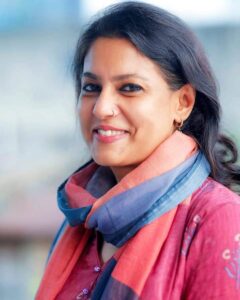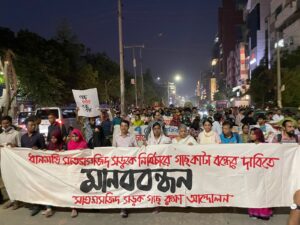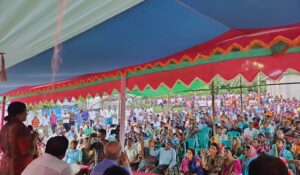
Syeda Rizwana Hasan is the Chief Executive of the Bangladesh Environmental Lawyers Association (BELA). Rizwana’s work has led her to be recognized by multiple awards, including one of the 40 Environmental Heroes of the World by TIME magazine (2009), the Goldman Environmental Prize (2009), the Ramon Magsaysay Award (2012), the Tang Prize (2020), and the International Women of Courage Award (2022). Rizwana shares her journey and what inspires her, along with the important work BELA does in the field of land and environmental justice.

Syeda Rizwana Hasan
When I first joined the Bangladesh Environmental Lawyers Association (BELA), 30 years back, it was founded by a young lawyer who had returned from the UK after completing his PhD in International River Law. We face serious issues with our neighbors regarding the sharing of international river resources. I could clearly see that he wanted to contribute to this field as a Bangladeshi. I joined the organization mainly because I wanted to do research, publish papers, and use those for my PhD scholarship. Initially, the organization was small, comprising only a few of us, including a driver and an office assistant – about six or seven of us. I was one of the first recruits of BELA in 1993.
I contemplated leaving the organization because I was tasked with studying laws on forestry, fishery, and regulations against the use of harmful nets for aquatic biodiversity. Given my academic achievements, I didn’t want to delve into these topics. However, I was then assigned the task of compiling all the environmental laws of the country, which I successfully accomplished. Then, I was sent to the field. When I started visiting the field, I started interacting with communities and I started recording their grievances.
“It was very clear that we had all the laws that can solve all their problems – but these laws were just not being implemented.”
From the very beginning, I knew that I would be a non-conventional lawyer, meaning that I would practice but wouldn’t charge a fee for representing people, or at least, wouldn’t turn down those who couldn’t afford to pay me. I also wanted to be in academia.
This job took me to the communities. This job allowed me to interpret law in a positive way. This job gave me the satisfaction as a practicing lawyer, and it also met the thrust of my academic soul.
“It is my work with the community – the fact that I can be of some assistance to them – which is extremely fulfilling and that is what has kept me here.“
My job also takes me to different places, where we can do fascinating work. My work connects me to movements that are taking place in other parts of the world. For example, I am part of the NGO Shipbreaking Platform. We are now attending meetings with the European Parliament and the European Commission on the issue of shipbreaking. It is the European vessels coming to our part of the world and dumping waste, which is destroying the environment and having an impact on the laborers and also the community. And we can see that with years of advocacy with friends in European countries, we have managed to get a ship recycling rule from the EU.
Similarly, working with communities has led to a better environmental legal system. And we have taken the community’s grievances before the judiciary; if we are not there, these communities would not have access to the judiciary, and they would not know their environmental entitlements. We are working with them to shape the environmental justice notion in Bangladesh – and that is what is keeping me going.

A rally against indiscriminate tree felling in Satmasjid Road of Dhaka
One particular instance will probably not be enough to explain the diversity of my work – and I like the diversity in my work. For example, I work on forest conservation and forest dwellers’ rights; river conservation; industrial pollution; and unplanned urbanization.
But I would name one particular case, which was a struggle against a very powerful realtor who filled up the wetland. When I filed this case, I did not know the consequences it would have, the challenges I would go through, the threats I would receive, the challenges I would face in the judiciary, and the opposition I faced from the senior lawyers. This case gave me confidence that you can actually use the law for the benefit of the common people, and that you can fight the huge corporate entities, provided you are connected to the ground realities – and you articulate your grievances in such a way that you don’t leave many loopholes for your opposition to take advantage of.
This was a seasonal marshy land, so during the monsoon, there will be water and flood flow zones. We don’t have a structured drainage system in our part of the world; these are the natural drainage systems we are blessed with. And these were older lands; they were privately owned. One particular developer was filling up the land and city authorities were putting up public advertisements, telling people not to buy plots there because it’s a flood zone and identified as a wetland. But they were not effective enough to prevent the realtor from filling up the land and from selling plots.
“After all these challenges, when we won, that told me that you can withstand pressure when your sense of justice is tagged to the grassroots realities, and you are convinced about the arguments you are making.”
So we filed the case – but this particular group had already sold plots to many influential people. These housing projects were not meant for poor people, who actually need housing. These projects were for people who already own a flat, an apartment, or a house or plot in the capital. So their buyers were an influential segment of the community. And the [developer] had the capacity to bribe every system, and were paying the media up to 20,000 Taka to place regular TV and newspaper advertisements at the time, in 2003. They were grabbing people’s land and forcibly dumping soil on their land. Once you dump soil, even if you remove it, the land will not have the same fertility.
At that time, we were having heavy rain falls in Dhaka – which made the whole city go underwater because the natural drainage system was destroyed. We filed the case in favor of the communities, also challenging unplanned urbanization and the failure of government agencies to regulate delinquent housing companies like this. And he wasn’t the only one. There were a hundred other other housing companies doing the same thing. So we went after him to create a precedent because the government apparently did not give him any authorization. We fought the case. And when we won it, only two newspapers made the lead news.
“I won’t leave this profession, because if I don’t do this, there are not many lawyers who work for this community. These communities do not have other lawyers to go to.”
We started back in 1993. And this was 2003. In 10 years time, this environmental case became high profile litigation. It was so high profile, that all the senior lawyers of the country came together to defend this particular developer. So that made the lead news. We also had some seniors who were supporting us, so you wouldn’t be able to name one senior lawyer of the country who was not involved in the case – either with us or against us.
That was a turning point, because it gave me confidence after all the negative media propaganda, after all the seniors joined against me in that case – and after having to carry my six day old, third cesarean child to court to do the hearing.
We have been doing this work for the last 30 years. We have seen other amateur environmental lawyers, but there is no other organization that has come up in Bangladesh in the past 30 years to do work on environmental justice issues, because it’s financially less rewarding. And it’s very challenging. That is why you see people praising us and people attacking us. Any environmental problem in the world that you name is there in Bangladesh. This is the only group that has been working with the sole focus on environmental justice for the last 30 years; if we don’t work, the communities will not find lawyers to take their cases.

A public engagement with farmers in Banishanta, Khulna.
What helps me keep going is the power of truth. You know that this model of development is just not working. You know that this capitalist form of economy has only been exploitative of people and natural resources. That’s not a sustainable model at all. That’s the negative side of it – there is a need to change it. The positive side of it is there are good examples that you can amplify, and that can form the basis for revisiting the development model.
“What keeps me going is my sense of justice, the need of the communities to get justice, and the force of law to provide justice.”
In the face of climate challenges, if I don’t work for the protection of the planet, I will be leaving behind my children a world that is not livable. I live in Bangladesh and the frequency of natural disasters is increasing very fast. We have some of the most polluted air in the world. I live in one of the least livable cities in this world. So while I can practice constitutional law, criminal law, or civil law, and earn a huge amount of money, at the end of the day with that money, what will I do? If I can’t breathe, if I can’t drink, if I can’t have poison free food, if my children have to live in world record setting temperatures, if they have to accept that Dengue is part of their everyday life, and they have to live in a state of panic all the time – what do I do with this money? Instead, if I remain here, work for a better planet and work for a just economic order, and work for the protection of mother earth – I think that is the best thing I can do for my children.
And in my environmental cases, I have to deal with criminal law, because people who come to us are being intimidated there, harassed, with false criminal cases against them – so I have to defend them. I have to also read company law, because I fight against companies. I also have to deal with civil law, because I deal with people’s land rights. Professionally, it’s also enriching me every day.